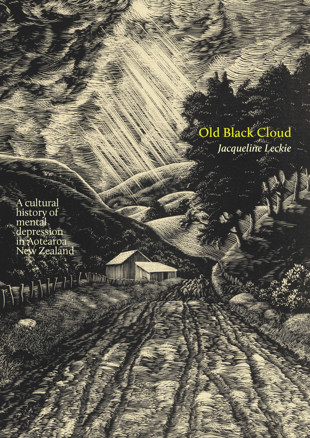Claire Macindoe reviews Old Black Cloud: A cultural history of mental depression in Aotearoa New Zealand:
‘RESEARCHING AND WRITING on mental health, in any context, requires a great
deal of care and consideration – something Jacqueline Leckie manages to succeed
in showing throughout her book. It is evident that this is not only a well-researched
piece of work, but is also something that Leckie has dedicated a great deal of time
and thought towards. Engaging from the beginning, what shines through in the book
is the focus on the stories of individuals who found themselves living under the ‘black
cloud’ of depression or melancholy. Their voices are interwoven throughout the
work and provide insight into the lived experiences of a variety of people throughout
New Zealand. Leckie freely shares her own experience of depression, grounding the
reader in the deeply personal and individualistic nature of mental health.
It is, however, quickly acknowledged that while Leckie can freely share her own
experience, it is far more complicated trying to access patient records dated post-1920
due to privacy restrictions. Telling the story of those who experienced hospital or
institutional care during the twentieth century is reliant on publicly accessible sources
or personal recollections. This is a common challenge for those working in healthbased
research and it should be viewed as a positive that this gap in the primary source
material is openly discussed. An unintended consequence is that at times the work
does feel as though there is a greater focus on the pre-1920 era through the examples
given, which is where most of the historiography already lies.
An important question that underlies this work is the ‘why’. Why do some people
experience a decline in mental health? This work is rich with examples pulled from
the archives that try to answer this question. This includes examples from Māori,
Chinese, and Pacific communities. It is acknowledged at several points throughout
the book that mental health is understood through a westernized lens, resulting in
Māori, Chinese, and Pacific peoples being held to western ideas and standards of
wellbeing that may not align with their own cultural ideas, leading to racially
prejudiced diagnosis and treatment. This prejudice, however, begins before recorded
medical intervention takes place. Archival records and older academic works give a
false sense that Māori did not experience depression and melancholy with the same
frequency or severity as Pākehā. While Leckie does briefly address this misleading
idea, suggesting the importance of whānau support in keeping Māori out of western
institutions, this discussion could have been developed further to acknowledge the
disparity of access Māori faced, as well as the additional problem of identifying and
tracing Māori through archival documents. Unless specifically stated as Māori within
the admission register or patient file, Māori using anglicized names could be wrongly
assumed to be Pākehā and miscounted as such.’
Read the rest of the review here.


